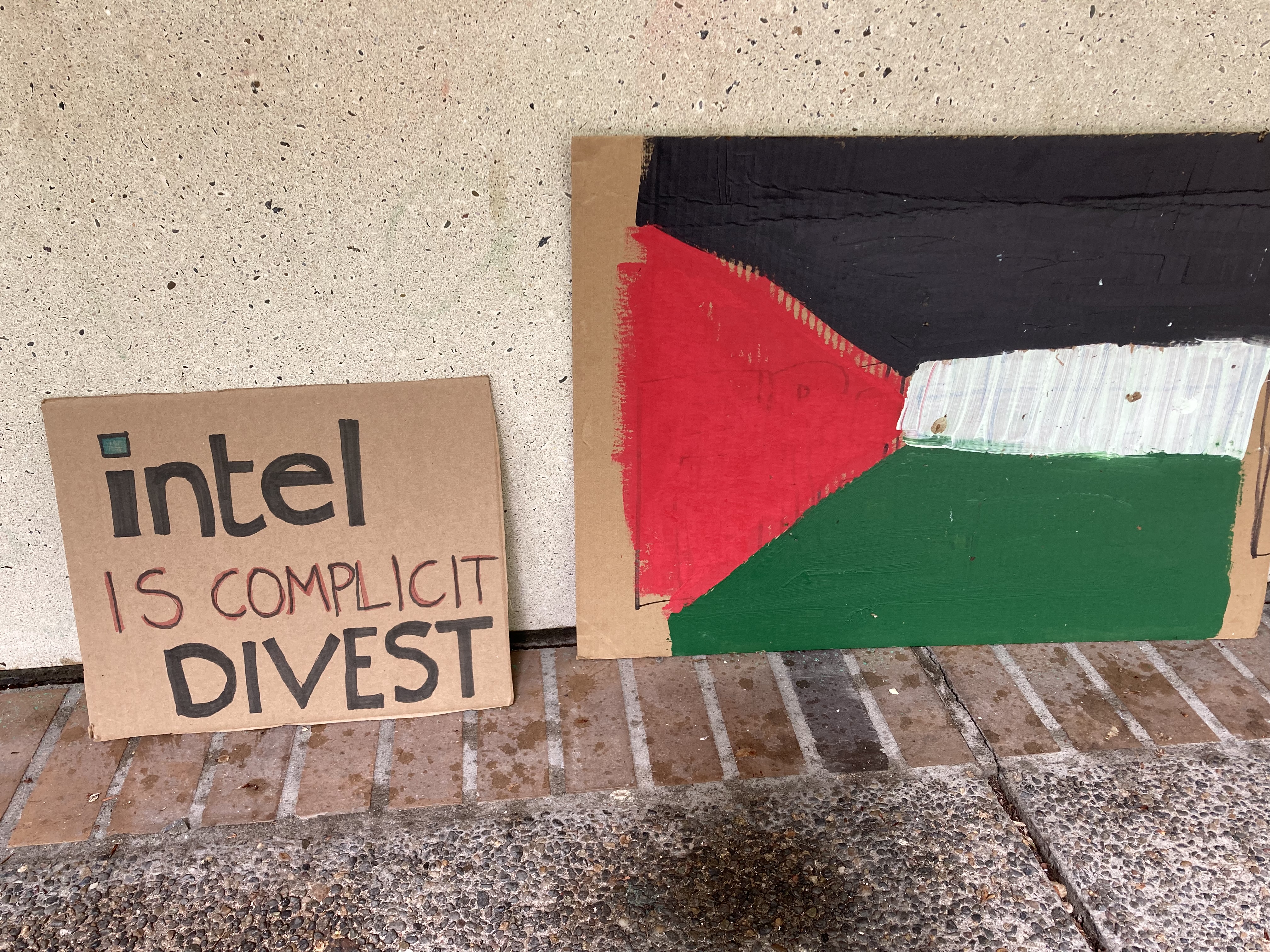
Signs from protesters against the war in Gaza during a multiday occupation of the Portland State University library on May 1, 2024, in Portland, Ore. One demand from protests at campuses across the country is for schools to cut ties with companies that have operations in Israel.
Kyra Buckley / OPB
A piece of cardboard with “Intel is complicit, divest” painted across it sat among the protest signs covering the steps of Portland State University’s library last week when it was occupied by protesters against the war in Gaza.
The term “divestment” has been used for decades in protests on college campuses, and often refers to a demand from demonstrators that schools cut financial ties with a company or country they say is harmful. Experts say calls for divestment rarely, if ever, have a financial impact on the intended target. However, divestment calls likely help demonstrators raise awareness about the issue they’re protesting — and about how money flows between educational institutions and large businesses.
Intel has been just one target of student protesters in Oregon who are calling for an end to the war in Gaza. The chipmaker is the state’s largest private employer with more than 20,000 employees. It helps fund research and technology programs at many Oregon schools. The company’s ties to Oregon and the U.S. government have only gotten tighter in recent months, with Intel receiving state and federal financial incentives, which are contributing to the company’s plans to invest $36 billion in Oregon facilities in the coming years.
At the same time, Intel has significant ties to Israel. It has multiple facilities in Israel and has invested more than $50 billion in the country in the 50 years it’s had operations there.
Intel, which did not return a request for comment for this story, is just one company protesters have included in their divestment calls. It’s become increasingly common for university endowments to be invested in multiple companies. Demonstrators against the war in Gaza have called on schools across the state to divest from a number of companies with ties to Israel, such as Boeing and Lockheed Martin.
The tactic is not new. For decades college students have demanded divestment around issues that matter to them, according to Bruce Podobnik, associate professor of sociology at Lewis & Clark College.
“The Vietnam War is an example where college students and university students around the country really pressured their schools to divest and disconnect from the military industrial complex,” Podobnik said. “It didn’t always work. It’s very difficult sometimes for colleges and universities to make those changes — but it did have an effect.”
Podobnik said there’s a social movement cycle that protests tend to move through, and nowadays it often starts on social media with an issue going viral.
“College students all over the world will become concerned about issues, and then activism will emerge out of that,” he said. “And it might spread really rapidly, as we say, like wildfire.”

FILE - Hundreds of people attend an anti-war protest on Portland State University's campus on April 29, 2024.
Kristyna Wentz-Graff / OPB
That’s often followed by demonstrations and increasing news coverage, Podobnik said, which attracts the attention of officials and other authorities. That can lead to an intensification, like the occupation at the PSU library and the police response. Then things taper off.
“Even though we can anticipate here in Portland and across the country that the student protests will diminish over time, they still leave a lasting impact after them,” Podobnik said. “I think it’s important to recognize that cycle is inevitable — and it’s powerful.”
Powerful, he said, because it raises awareness. At the beginning of the cycle, the message may be targeted at university officials, companies and lawmakers. As the protest gains media attention, it may expand beyond that. Tactics like calling for divestment may cause individuals to think about what their own investments support, or it may prompt them to research more about where certain companies operate and spend money.
But Podobnik is clear that demanding divestment is a tool used as part of a larger strategy for a protest movement. He points to protests against apartheid in South Africa in the 1980s. Podobnik said divestment wasn’t the reason apartheid ended in the country, but it added pressure to the situation and the movement helped raise awareness in the U.S.
Cliff Bekar, economic historian at Lewis & Clark College, said ultimately if a university did pull its investments, it’s unlikely to hurt a company financially or force a change in foreign policy.
“It’s fair to say the overwhelming consensus right now in the empirical literature is, if a divestment initiative is limited to universities or even a small set of universities,” he said, “the impact on the companies is zero.”
Bekar said as the global economy becomes more interconnected, it’s increasingly difficult to target a specific country or source with a divestment campaign. There also could be unintended consequences at a university after the divestment, like less money available for scholarships.
At Portland State University, school President Ann Cudd agreed to pause all ties to Boeing, citing concerns from the community regarding the company’s weapons manufacturing divisions and ties to Israel. Cudd said the school had no investments in Boeing but did accept donations from the company.
She has not addressed calls to cut ties from other companies, like Intel. Leaders at other schools in the state have either said they will not divest from companies with connections to Israel, or they haven’t specifically responded to the protest demand.





